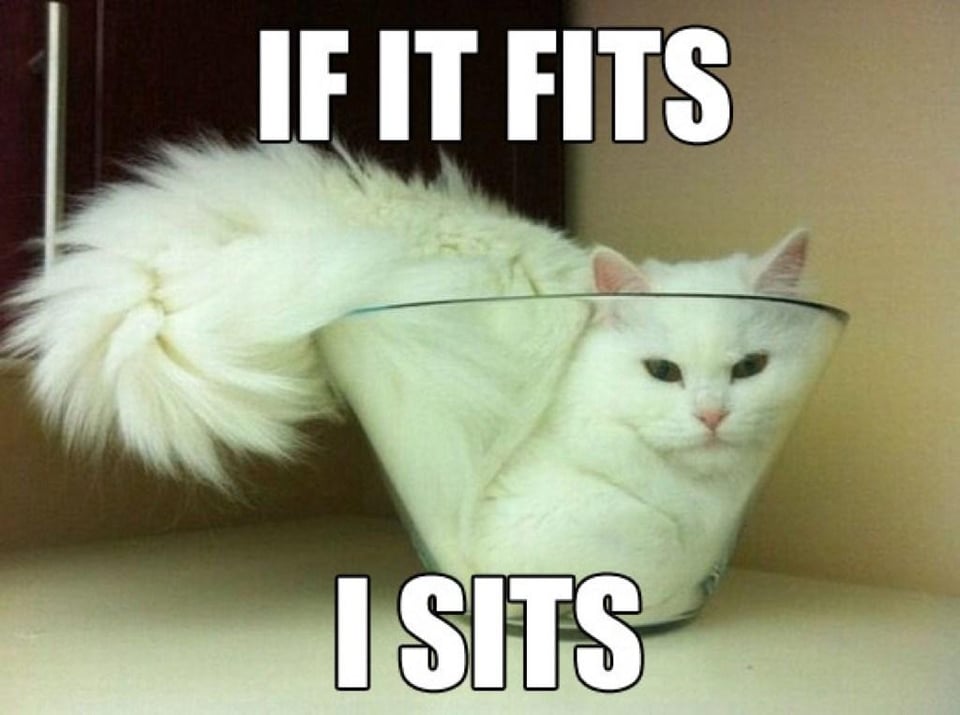If Computer Fits, It Sits?
Big Tech companies, get your act together and remember you serve at OUR pleasure. If we don't like how you're “disrupting” our livelihoods and our cultural spaces, we'll turn off the computers.
Tough reading long-form these days?
Listen to the audio edition of this issue here, as read by a real human…me! 👋😊
It appears the overarching goal of Silicon Valley for the last decade or so has been to act like the tech equivalent of LOLcats.

Every tech company's dream: I can haz all your disposable income.
We see this now in the context of GenAI All The Things!! but in reality it's nothing new. There literally was a movement not so long ago called The Internet of Things. It was the (utterly misguided) notion that everything which could (in theory) be a computer should be a computer. This was borne out in a long string of laughably poor products. Do you really need the Internet in your kitchen toaster? Or your air fryer??

Are you revisiting the role computer technology should (and should not!) play in our lives? Make sure you don't miss another issue of Cycles Hyped No More:
Jared’s Theory of Computer Form Factors
I believe every successful form factor answers an obvious need that was present from the very dawn of the computer age. It's really not that complicated when you think about it. Let's go down the line:
- The PC (Personal Computer): solves the I need a computer on my desk problem.
- The Laptop: solves the I need a computer in my briefcase/backpack/etc. problem.
- The Tablet: solves the I need a computer here in my hands problem.
- The Smartphone: solves the I need a computer in my pocket problem.
From here things get real murky, real fast.
- The Smartwatch: does less than a smartphone in almost all respects, but it does fit on your wrist so it's helpful for health/fitness and quick communications. For many people (me!), it's not a must-have.
- The Smart TV: it's been proven that people don't want to "use a computer" when they sit down to watch TV or play a game. They want to, y'know, watch TV or play a game. So the computery bits are only useful insofar as they facilitate those key tasks.
- The VR Headset: again, the key use case here seems to be entertainment. Play games or watch video content. There's little evidence the mass market is begging for a computer strapped to their face.
- The EV: computer tech definitely makes modern vehicles seem whiz-bang and cool, but beyond passive entertainment and facilitating key functions I don't know why you need a computer in a car.
- The AI Pin: this is not a thing. It just isn't. Stop pretending it is.
- The Home Assistant Speaker: let's talk about this one for a moment.
Companies like Google and Amazon have been pushing the "smart speakers" category for some while now, and Apple sorta-kinda got into the mix with HomePod. There's also a variation of the home assistant that has a screen, bumping up against the tablet category (except this isn't meant to be mobile).
I won't deny this category has been relatively popular, and some folks may even swear by it, but I would argue it's also superfluous on a grand scale. It's simply another nice-to-have. (Personally I've never seen the point of owning one.)
The reason I bring all this up is there's this strange, all-pervasive notion in tech media circles that the industry is desperate to find the Next Big Thing™. It's the thing that will presumably unseat the smartphone as the computing device for the masses.
Here's my simple question: But why?
Again, back to my theory of sensible computer form factors: computer on your desk, computer in your bag, computer in your hands, computer in your pocket. My contention is that's all you really need.
And many people don't actually need all of those at once. Some people love tablets (me!), some people are fine with just a laptop. Some people don't want desktop computers anymore, others still swear by them (also me!). Some people are even sick of their smartphones taking over their lives and are trying simpler pocket computers which only fulfill certain basic needs.
I believe you could time-travel back to the dawn of computing and find dreamers who'd already anticipated all these form factors. They weren't revolutionary upon release because nobody had ever imagined them before, they were revolutionary because they finally worked. When the iPad first came out, folks immediately pointed out how much they were reminiscent of the PADDs in Star Trek: The Next Generation. Did Star Trek invent the modern touchscreen tablet? Or did they just extrapolate out logically from early known personal computer systems?
Which brings me to the one futuristic form-factor the masses might actually want:
Smart Glasses, the Holy Grail
Glassholes and many technical missteps aside, the idea of eyeglasses which essentially look and behave like their traditional forebears but provide the additional functionality of a HUD (Heads-Up Display) or AR (Augmented Reality) overlay along with presumably some form of voice input has been a staple of science-fiction since forever.
I'm not here to claim that once marketable smart glasses arrive, they'll kill the smartphone…because I've never believed they are a valid replacement for the "computer-in-your-pocket" need. Instead, my belief is that smart glasses will enable applications which are impossible today.
One of the original sins of computer & networked technology was that it's always had a fraught relationship with locality. In some ways it's easier for me to communicate with random strangers across the globe than it is to communicate with people in my local community. There have also been many attempts to introduce people to the idea of their phones being a window where you engage with local entities in real-time (retail in particular) and that's always been a privacy nightmare and just plain creepy. (No, I don't want my pocket computer to start buzzing with ads and deals and sign-up forms the moment I walk into a store. No, I don't want to "check-in" and advertise my current whereabouts to online stalkers or the gubmint.)
However, that doesn't mean there's not a role to play for the world to have an "AR layer" while you're wearing smart glasses. I think travel & tourism could be amazing with a map-based AR layer.
Imagine a Web site for a botanical garden showing information on whatever it is you're looking at while you are looking at it, rather than you having to click around their site on a separate device for history and botany facts disconnected from the immersive experience. Or imagine walking down a boulevard and browsing a sidewalk café’s menu at a glance without even having to walk up to it or fiddle around with your pocket computer.
However, the only way this form factor might ever take off in some capacity is if it respects the following fundamental values:
- The AR content is all part of the Open Web and not silo'd in corporate hellscapes and proprietary app stores.
- Information is pull, not push. In other words, anything I'm seeing in my HUD is something I've requested, not something literally shoved in my virtual face.
- There's no vendor lock-in. My ability to publish to this AR layer shouldn't be dependent on any single company controlling the scope of this layer.
This is why I'm pretty skeptical that today's state of the computer industry can come up with a workable version of Smart Glasses that people love and appreciate. The Open Web we have today for our computing devices is under assault, buckling under relentless attacks by bad actors and nauseating Big Tech companies. The very idea I'd want to stick computer glasses on my face and experience a future version of Instagram or X or Gemini or ChatGPT makes me want to vomit.
The Backlash is Real
I want to close by sharing some "anecdata" that a lot of the normies out there, and even some of us tech nerds, are feeling pretty burnt out by computers taking over culture and commerce everywhere all the time. We're feeling pretty fried by the Attention Economy and are ready for our attention to be better spent outside of online corporate hellscapes.
All of this lends credence to my view that, for the foreseeable future, there is no Next Big Thing. We have all the computing form factors we need already (sorry Sam Altman & Jony Ive, lol), and many people are increasingly trying to reduce time spent sucked into a computer world and increase their time having meaningful experiences out in The Real World™. AirBnB's CEO all but said as much in a recent Decoder interview talking with Nilay Patel.
As much as it pains me, a decades-long computer nerd, to say this, I'll say it. Computers need to understand their place. They are tools which can help make our lives better if built well and used correctly, but they can also make our lives miserable. To the extent they are making us feel worse not better, and to the extent they are pulling us apart as a species rather than bringing us together, we need to firmly tell them to get lost.
Big Tech companies, you're on notice. Get your fucking act together and remember you serve at our pleasure. If we don't like how you're “disrupting” our livelihoods and our cultural spaces, we'll turn off the computers. We need you a lot less, and you need us a lot more, than anyone is willing to admit. (Tech media, I'm especially looking at you!)
It's time for a rebalance, and that's exactly what I'll continue to talk about here on Cycles Hyped No More. Thanks for reading, and I'll see you here again next week!
Cheers,
Jared ✌️
🤔🌩️ Things that make you think:
The biggest idea that might govern all of this, that might basically describe where we’re going with design language, where we’re taking the company, and my vision for the future is that the real world is magical.
Imagine the real world didn’t exist and we only lived on devices, and suddenly, a Steve Jobs–like figure stood onstage and invented the real world, and they said, “Today I’m introducing the real world.” And you’d be looking around, you’d be like, “Oh my god.”
It’s easy to forget how incredible the real world is. I think interface, design, our product, everything is going to go into the real world. Maybe another way of saying it isn’t that we’re going to all live in these digital realities. It’s that we’re going to bring those into the real world.